The Americana, sometimes known as the Easter Egger, is a gentle and calm breed of chicken.
Americanas are ideal for backyard farming because they require little care and make good pets. Another element that excites many people about Americana chickens is the mystery of what color of egg they will lay next. It makes them a popular choice for people who want to add color to their egg baskets.
If you’re interested in raising Americana chickens, here is a thorough profile that will help you learn how to care for them.
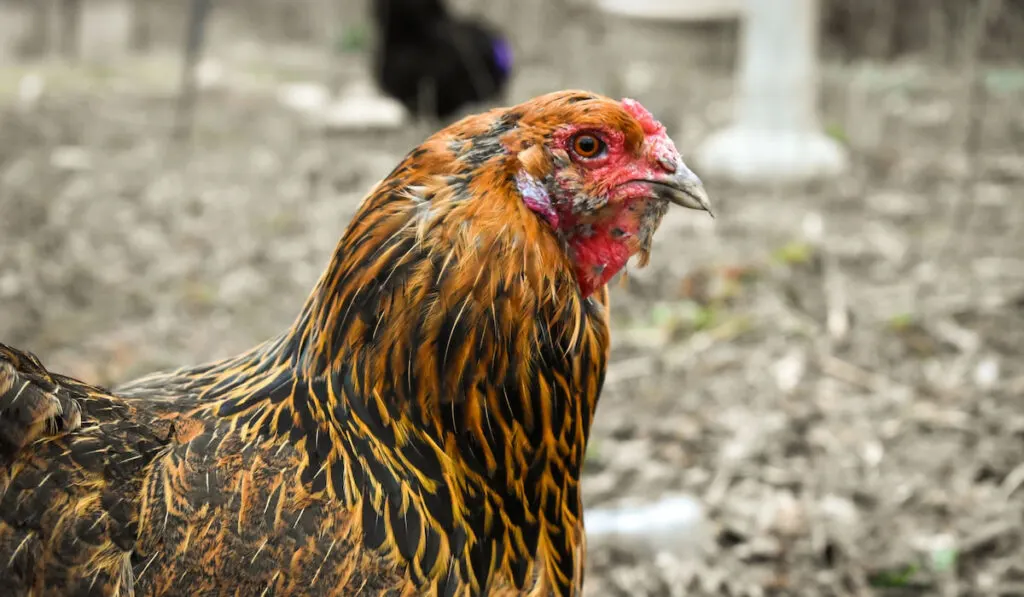
Table of Contents
Americana Origin and History
The Easter Egger chicken is not a pure breed. It is a hybrid or mixed breed, bred to generate eggs with various shell colors.
The Easter Eggers originated in South America, where ancient indigenous chicken breeds such as the Araucana laid blue eggs.
Then, in the early twentieth century, US breeders began selectively breeding these South American chickens with other breeds.
Other breeds included colored egg-laying breeds such as the Ameraucana, Rhode Island Red, and Plymouth Rock.
These other breeds also had other desirable characteristics, such as a good disposition and toughness.
Thus, they created the Americana chicken, also known as the Easter Egger. People named the Easter Egger after the brightly colored Easter eggs traditionally associated with the event.
While the phrases “Americana” and “Easter Egger” are often used interchangeably, the term “Easter Egger” is more commonly used.
Easter Egger refers to mixed-breed chickens not recognized by the American Poultry Association as pure breeds.
Americana Breed Appearance
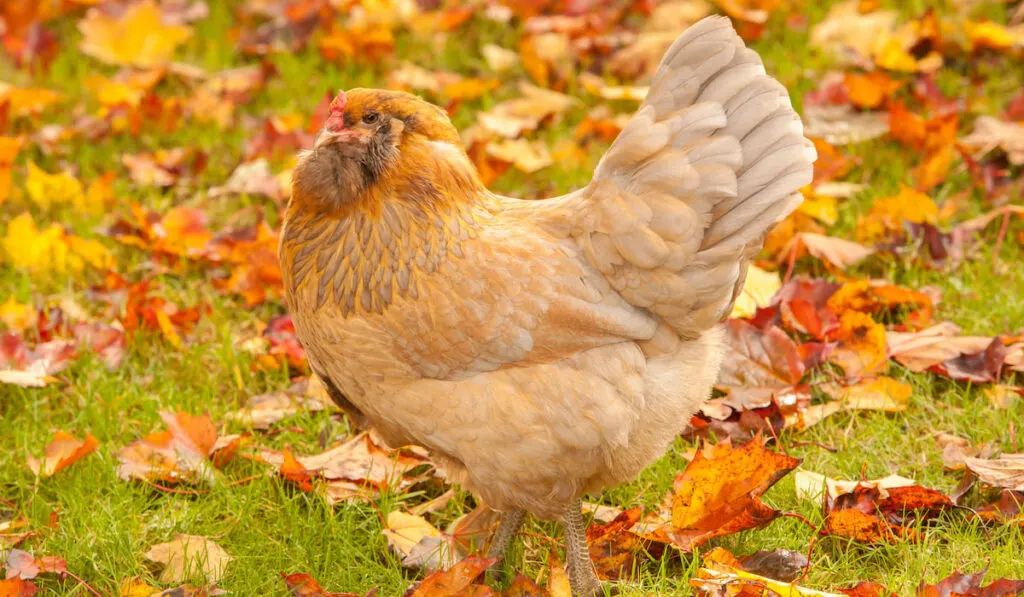
The Americana chicken is unique in every way. It is unusual to find two Americana chickens of the same color. Some can be brown, speckled, white, or black; others can be orange, yellow, or any color.
The physical characteristics of the Americana chicken include the following:
- They have a distinctive appearance due to their medium-sized ear tufts resembling muffs or beards.
- They often have yellow, unfeathered legs with four toes.
- They have a pea comb closer to the head than other comb types.
- They produce colored, vibrant eggs in various hues, including blue, green, pink, and brown.
- They weigh 4–6 lbs.
- The roosters are louder than hens and can crow in the morning and throughout the day. On the other hand, hens are generally quiet but occasionally make noise when conversing with other chickens or laying eggs.
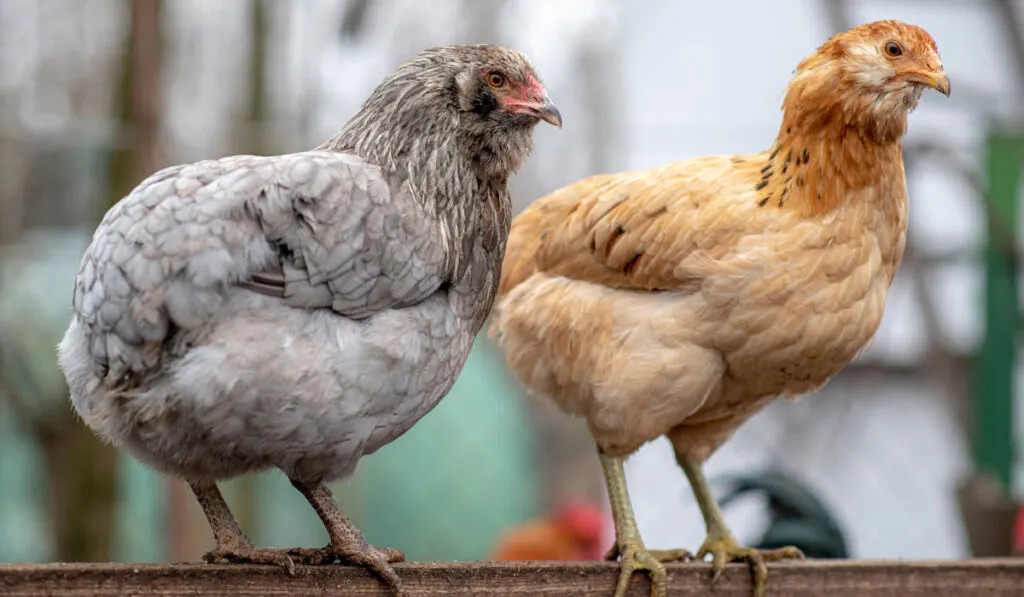
Americana Chicken: Similar Breeds
Americana chickens are a mix of different breeds, which makes it difficult to find exact matches.
The table shows a few similar breeds that may interest you.
| Characteristic | Ameraucanas | Easter Eggers | Araucanas |
| Breed Status | Acknowledged breed by the American Poultry Association (APA) | Not a recognized breed by APA | Recognized breed by APA |
| Feather Colors | Blue, Black, Brown Red, Silver, and White | Any color, including those not found in purebred Ameraucanas or Araucanas | Black, Black Breasted Red, Silver Duckwing, White, and Blue |
| Earlobes | Blue | Red or white | Red |
| Muff and Beard | Yes | Yes (sometimes) | Yes |
| Leg Color | Slate or black | Any color | Slate or black |
| Egg Color | Blue | Any color, including blue, green, brown, or pink | Blue or green |
| Ear Tufts | No | Yes (sometimes) | Yes |
| Genetic Defects | None | None | Some may have a lethal gene that can cause chicks to die in the egg or shortly after hatching |
Please note: Some of these characteristics may vary depending on the individual bird or breeder, so use this table as a general guide.
Americana Egg Production
The Americana is one of the perfect chickens to have in your backyard as layers.
Not only will your egg basket be the envy of your neighbors and friends, but you might have the opportunity to collect around four eggs per Easter Egger weekly. That is over 205 eggs per year!
These eggs are medium size and can be either green, olive, pink, blue, or multicolored.
Yet, it is up to you and how well you take care of your unique birds to determine the strength and quality of the Americana eggshell.
For example, chickens require a balanced diet with enough calcium and other nutrients to create strong eggshells. The quality of an eggshell might decline if a hen’s diet is low in these nutrients.
Also, as your Americana gets older, the quality of eggshells degrades because calcium, a necessary nutrient for producing sturdy eggshells, may be more difficult for their bodies to absorb.
Easter Egger Temperament
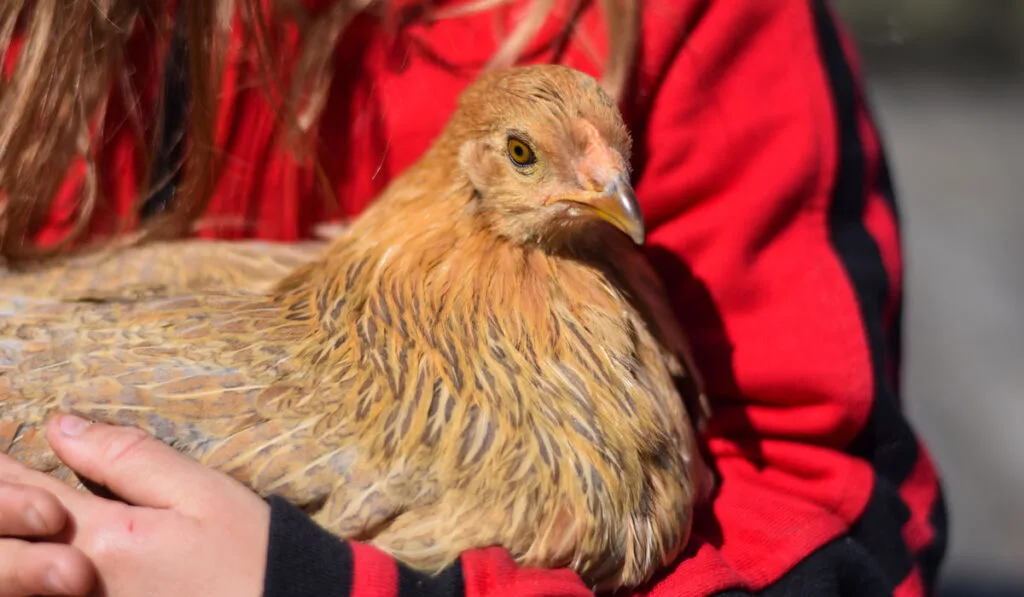
Easter Eggers exhibit the following temperament and personality characteristics:
- They are calm, intelligent, active, energetic, and can be easily tamed with regular handling. Therefore, they are a popular choice for backyard flocks because they get along well with children and other pets.
- They are wonderful for free-range or pasture-raised flocks because of their propensity for foraging and exploring their surroundings. However, they will require additional feed to ensure they receive all the necessary nutrients.
- They are tough and adaptable, making them ideal for backyard flocks in various climates and living situations.
- They are not aggressive and are often maintained in groups with other breeds.
Easter Egger Lifespan
You should expect a healthy Easter Egger to live for 5–8 years on average, with some chickens living longer and some not as long.
However, other factors might influence a chicken’s longevity, including the following:
- A diet deficient in critical nutrients like calcium and vitamins or excessively abundant in fat, protein, or carbohydrates can severely impact a chicken’s health and lifespan.
- The temperature, humidity, illumination, and cleanliness of the coop or living space can all impact a chicken’s general health and lifespan.
- Illnesses and diseases affect lifespan, some of which are fatal if left untreated.
- Predators such as foxes, raccoons, and dogs can attack or kill them, reducing their longevity.
- Stress caused by overcrowding, bullying, or changes in their surroundings may result in a reduced lifespan.
- A lack of exercise and movement leads to obesity and other health problems.
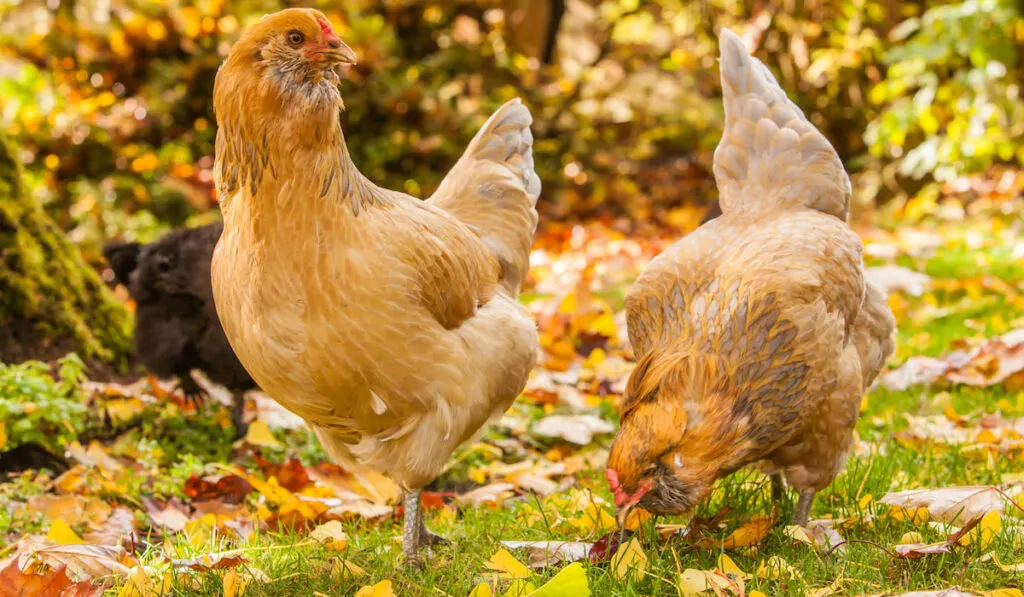
Best Practices for Raising Easter Eggers Chicks
Raising Easter Egger chicks can be a rewarding experience. But it is important to provide them with proper care to ensure they grow into healthy, happy adult chickens.
Here are some best practices for raising Easter Egger chicks:
Housing
The chicks will need a safe, warm, and dry place to live. A good option is a brooder box with a heat lamp and soft bedding, such as wood shavings.
Temperature
You will need to keep the chicks at a consistent temperature for the first few weeks of their lives. The temperature should start at 90°F to 95°F and gradually decrease to 70°F for several weeks.
Nutrition
Feed the chicks a high-quality chicken starter feed that is high in protein and provide clean water. Offer grit or small stones to aid in digestion.
Health care
Keep a close eye on the chicks for signs of illness or injury and seek veterinary care if needed. Vaccinating your chickens is recommended to protect them from common infectious diseases and prevent outbreaks.
Socialization
Chicks benefit from socializing with other chickens, so provide plenty of space for them to move around and interact with each other.
Environmental Enrichment
Offer the chicks perches, branches, or other items to climb on, as well as toys or treats to peck at. This will keep them mentally stimulated and physically active.
Gradual Outdoor Exposure
Once the chicks have grown their feathers, gradually introduce them to the outdoors for short periods, increasing the length of time as they age. It will help the chicks adjust to their new home.
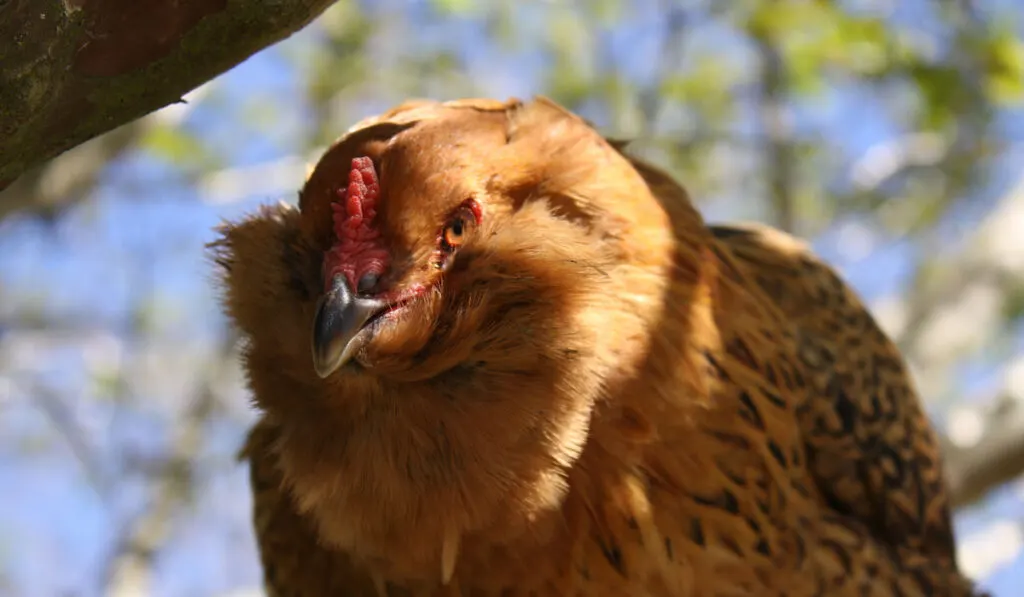
Easter Egger Cold and Heat Tolerance
The pea comb on Easter eggers helps them adapt to cold climates better than other chickens. Mainly because the pea comb is smaller and more compact than the single comb on other chickens.
Also, they do well in cold climates because the pea comb is smaller. Furthermore, their fluffy feathering helps with insulation when it is cold.
These adaptations allow Easter Eggers to tolerate cold and hot temperatures better than some other breeds.
But you can still keep Easter Eggers comfortable in cold and hot temperatures using these tips as shown in the table below.
Tips for cold weather
- Provide plenty of insulation in the coop to keep the birds warm. Use good-quality bedding, such as straw or wood shavings. Ensure the coop or shed has insulated walls and is well-ventilated but not drafty.
- Make sure there are no drafts and that the coop is dry. Wet conditions can cause the birds to become chilled and suffer from infections, so keeping the coop as dry as possible is essential.
- Provide plenty of food and water. In cold weather, the birds need more calories to maintain their body temperature, so ensure they have access to plenty of feed. Additionally, it is essential to check their water supply regularly to ensure it hasn’t frozen.
Tips during hot weather
- Provide a shaded area for the birds to rest and cool off. You can accomplish this through the use of trees, tarps, or other shade structures.
- Make sure the coop is well-ventilated to allow for the circulation of fresh air and the removal of hot, stale air. However, be careful not to create a draft, as this can cause the birds to become chilled.
- Make sure the Easter Eggers have access to clean, fresh water. Consider adding ice to the water to help keep it cool.
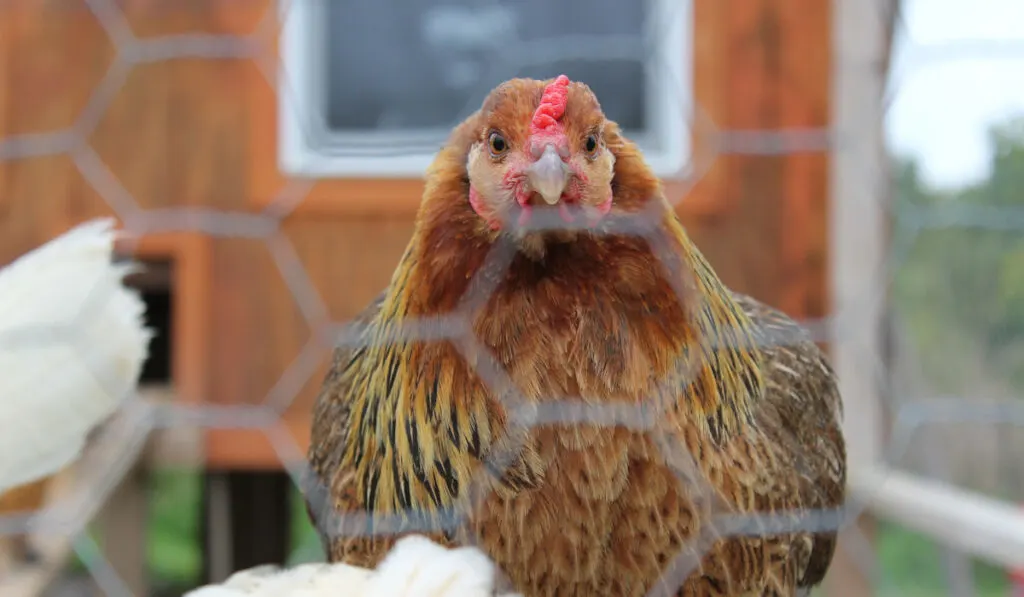
Easter Egger Common Health Issues
Easter Eggers, like many other breeds of chickens, are prone to infections caused by bacteria or viruses like:
Mycoplasmosis
Mycoplasmosis is a respiratory infection caused by a bacterium called Mycoplasma gallisepticum.
The symptoms include sneezing, coughing, nasal discharge, swollen eyes, and decreased egg production. Treatment includes antibiotics, supportive care, and vaccination.
Cholera
Pasteurella multocida is the cause of cholera in chickens. Symptoms include lethargy, diarrhea, difficulty breathing, and sudden death. Treatment includes antibiotics and supportive care.
Necrotic Enteritis
Necrotic enteritis is a bacterial infection caused by Clostridium perfringens. Lethargy, appetite loss, and bloody diarrhea are some of the symptoms. Treatment includes antibiotics and supportive care.
Fowl Typhoid
Salmonella gallinarum is a bacterium that causes fowl typhoid. Symptoms include lethargy, anorexia, diarrhea, and sudden death. Treatment includes antibiotics and supportive care.
Botulism
The bacterium Clostridium botulinum produces a toxin that causes the infection known as botulism.
Symptoms include weakness, paralysis, and difficulty breathing. Treatment includes supportive care and antitoxin therapy.
Parasites
Parasites like mites, lice, and worms can attack Easter Eggers. Symptoms may include feather loss, weight loss, diarrhea, and lethargy.
Egg-Binding and Related Issues
Occasionally, Easter Eggers may have difficulty passing an egg—egg binding—which can cause discomfort and distress. This can be a serious condition and may require veterinary intervention.
Easter Eggers may also experience problems related to their eggs, such as soft-shelled eggs, shell-less eggs, or other egg-laying difficulties.
Where to Buy Easter Eggers and Prices
You can buy Easter Eggers from the following online shops or physical farms.
- Chickens for Backyards, located in Pittsburg, Missouri, delivers birds all over the US. You pay $5.04 for a day-old not sexed, a $5.57-day-old male, and a $6.10-day-old female.
- My Pet Chicken in Brooks, Georgia, sells Easter Egger baby chicks at $4.99.
- Highland Mountain Farm sells Easter Eggers at $12.50 when they are just over three weeks old.
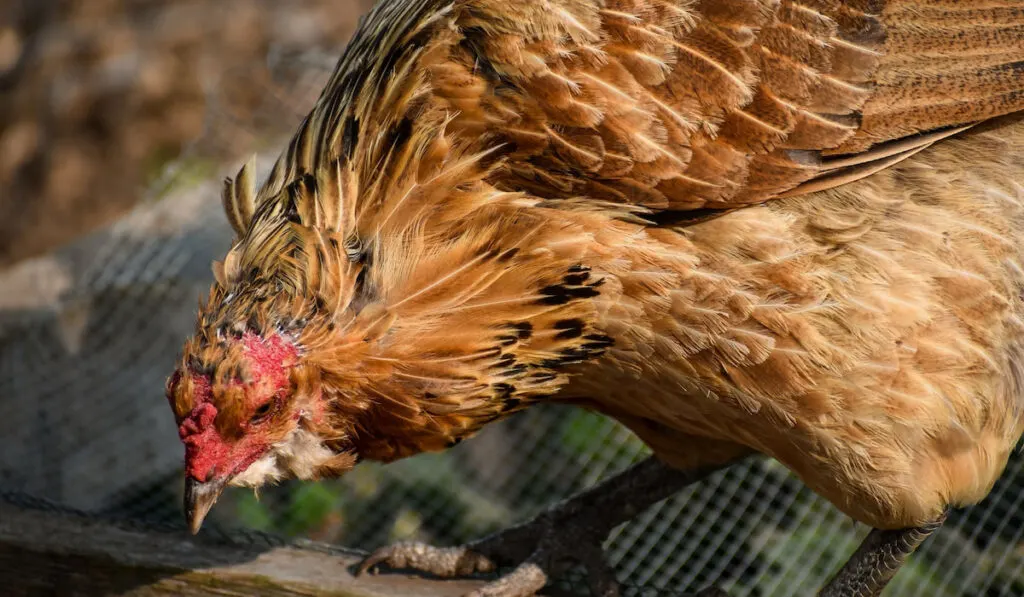
Frequently Asked Questions
Here are the answers to some of the most frequently asked questions regarding the Easter Egger.
An Easter egger can lay eggs of any color, such as blue, green, pink, or brown. The eggs’ specific color will depend on each chicken’s genetic makeup.
Easter Eggers can make good backyard flock chickens since they are resilient, friendly, and capable of producing quality eggs.
Easter Egger hens can lay an average of 3–4 eggs per week.
The annual egg production of an Easter Egger chicken is 200–250 eggs.
Resources
- https://www.chickensandmore.com/easter-egger/
- https://www.mypetchicken.com/pages/easter-eggers
- https://backyardpoultry.iamcountryside.com/chickens-101/easter-egger-chicken/
- https://www.mannapro.com/homestead/bid/144002/Chicken-Breed-Spotlight-Easter-Egger-Chickens
- https://www.getstronganimals.com/post/all-about-the-easter-egger-breed
- https://www.pamsbackyardchickens.com/2012/01/breed-profile-ameraucana.html
- https://www.roysfarm.com/easter-egger-chicken/
- https://petkeen.com/easter-egger-chicken/
- https://www.thehappychickencoop.com/olive-egger-chickens/
- https://www.thehappychickencoop.com/easter-egger/
- https://www.chickensforbackyards.com/product/easter-egger/
- https://highlandmountainfarm.com/products/mixed-color-easter-egger-pullets-3-weeks-to-8-weeks
